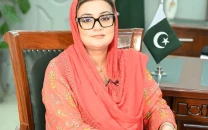Enrolment on a roll: ‘Send your children to school or face prison’
DCO to implement 1994 law, filing cases against parents not sending kids to school.

The district coordination officer (DCO) has threatened dire consequences for parents who refuse to enrol their children in school in the upcoming academic session. During a Universal Primary Education (UPE) campaign in the district, the DCO threatened that parents of children who were not admitted to school would face severe consequences under the law.
DCO Muhammad Asif Qureshi addressed a press conference on Monday and said that the admissions drive for primary schools had begun in the district and all parents were expected to send their children to school. “There is simply no excuse for parents not to send their children to school. If they cannot afford private education than it is mandatory for them to send their kids to public school which is free,” Qureshi said. The DCO said that an Education Department team had been petitioned to conduct a door-to-door survey in the area. “These people will go to each house and ask parents to send their children to school and register them on the spot. If parents refuse then they will read out the penalties under the law,” he said.
On the occasion, district monitoring officer Malik Ghulam Yasin said that the time had come to implement the Punjab Compulsory Primary Education Act, 1994. “We can’t afford to be lax about this issue anymore and now there will be penalties and fines for not enrolling children in school,” Yasin said.
The DCO said that the Punjab government had declared 2011 as the UPE admission year and all possible measures were being taken to admit the maximum number of students to school. “Free education and free books is one of the key measures in this regard. Poor people can no longer cite the excuse that they cannot afford to educate their children,” he said. Yasin said “If parents don’t send their kids to school now then it is because they are pushing them to beg or work for them,” he said.
According to the recent UPE campaign, the district administration discovered that over 69,749 children had not been admitted to school in the province despite being of age. “These children will be admitted to school with the help of society. We need to put pressure and impose penalties on parents who do not do so,” Qureshi said. “If the parents try to become a hurdle in the process they will face a punishment. We are even considering awarding the child’s custody to the state in such cases,” he said.
The DCO said that the enrolment rate in the district at present was less than half of what was required and the new measures were being put in place to ensure enrolment. “This needs to be done throughout the province to ensure that children are in school,” he said. Qureshi also ordered the Executive District Officer (EDO) Education to merge nearby schools that were lacking adequate facilities.
The UPE programme is bringing public education to the forefront by offering free education to students.
“The government is working to improve the standards of public education. Just because it is free doesn’t mean it shouldn’t be effective,” Qureshi said. Rural areas, where the number of those who live below the poverty line is quite large, is the prime target for public school enrolment campaigns.
The Punjab Compulsory Primary Education Act, 1994
Compulsory primary education— The parent of a child shall except in the case of a reasonable excuse cause a child to attend a primary school until the child has completed the primary education course.
Section 5: School attendance authority— (1) Government may constitute one or more School Attendance Authorities for the purposes of this Act.
(3) Where a School Attendance Authority is satisfied that a parent who is required under the Act to cause a child to attend a school has failed to do so, the Authority, after giving the parent an opportunity of being heard and after such enquiries as it considers necessary, may pass an order directing the parent to cause such child to attend a school on and from a date which shall be specified in the order.
Section 6: Offences— (1) Any parent who fails to comply with these orders shall on conviction before a Magistrate be punishable with fine which may extend to two hundred rupees and with further fine which may extend to twenty rupees for every day after the conviction for which the failure continues or with imprisonment which may extend to one week or with both.
(2) Any parent of a child or employer of such a child who, after receiving due warning from the School Attendance Authority continues to employ a child whether on remuneration or otherwise required under this Act to attend a School shall on conviction before a Magistrate, be punishable with fine which may extend to five hundred rupees and with a further fine which may extend to fifty rupees for everyday after the conviction for which the non-attendance at a school continues or with imprisonment which may extend to one month or with both.
(3) No court shall take cognizance of any offence under this Act except on a complaint in writing made by the School Attendance Authority.
Published in The Express Tribune, April 26th, 2011.



















COMMENTS
Comments are moderated and generally will be posted if they are on-topic and not abusive.
For more information, please see our Comments FAQ